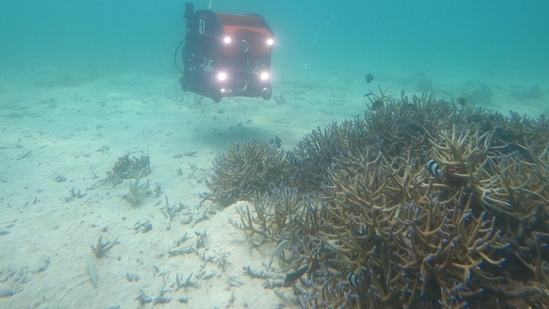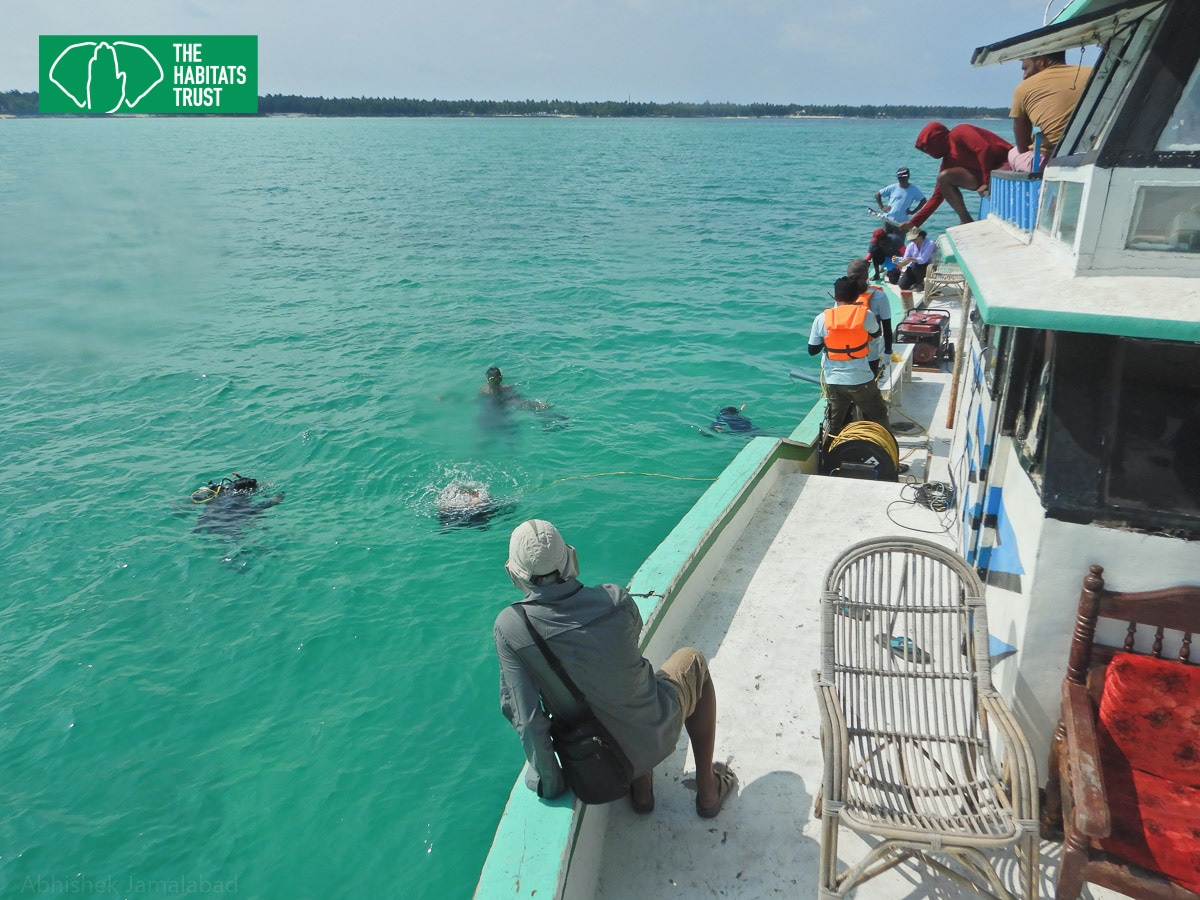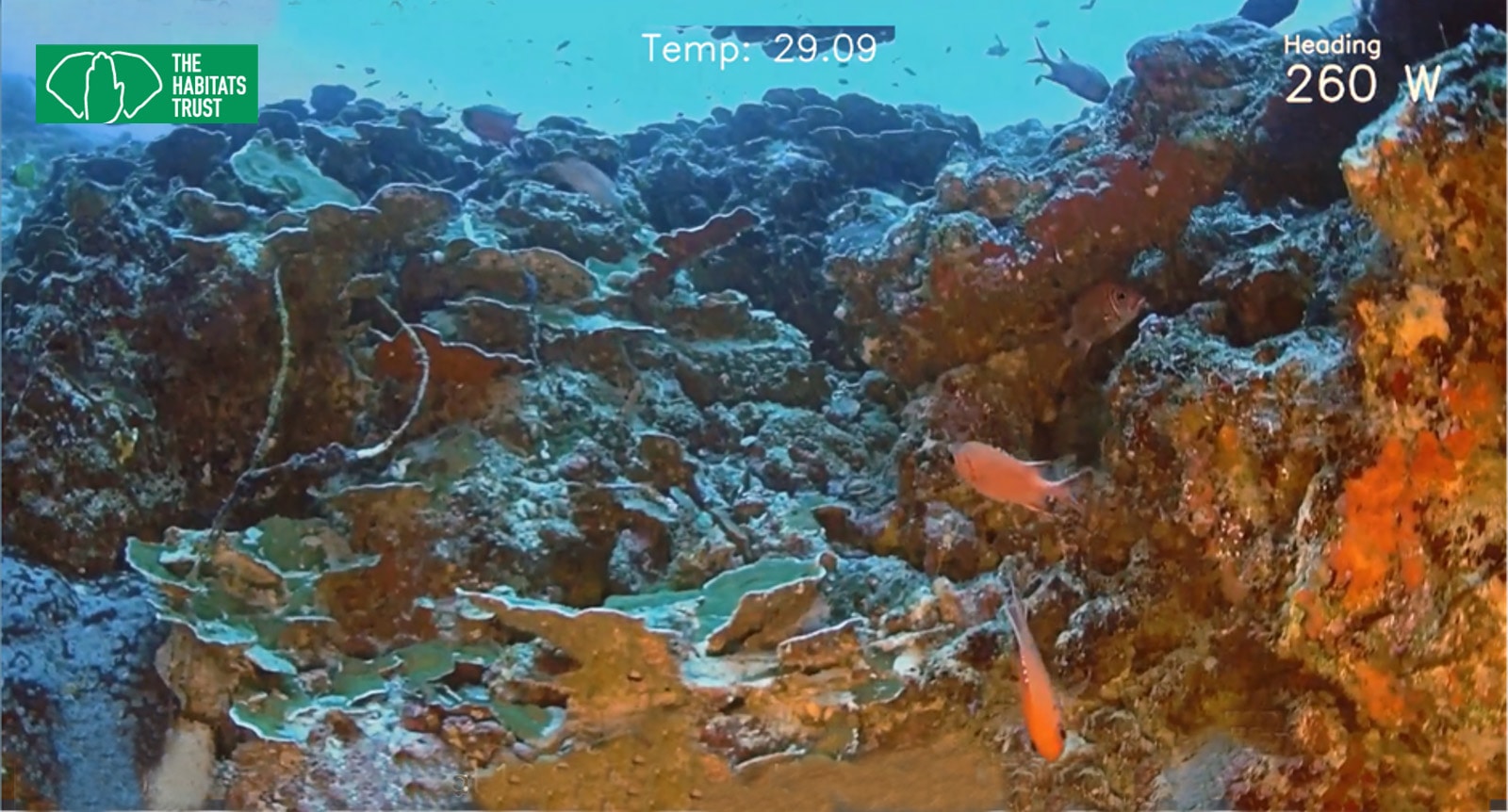Underwater robots reach new depths: Unlocking secrets crucial to coral reef preservation in India
Equipped with remotely operated vehicles, a team of researchers is exploring mesophotic reefs off the coast of Lakshadweep to combat climate change impacts
Off the coast of Agatti islands in Lakshadweep, a group of researchers have embarked on an exploration to uncover the secrets of uncharted underwater ecosystems. These ecosystems could be key to unlocking new insights into coral biodiversity and developing strategies to combat the devastating impacts of global warming, bleaching, and ocean acidification.

Using advanced remotely operated vehicles (ROVs) — uncrewed underwater robots that provide visual and environmental data — the researchers have been exploring the mesophotic coral reefs at depths beyond 40 metres. As against the recreational scuba diving limit of 40 metres from surface waters, the ROVs allowed the team to reach depths of up to 103 metres. This is the first time that an ROV has been used to such depths for conservation research, marking a milestone in marine conservation in India and opening new avenues for understanding and preserving deepwater ecosystems.
For the past two years, The Habitats Trust, a not-for-profit organisation focused on conserving lesser-known species and habitats in India, has been conducting a series of ROV trials at reefs in Indian waters. The trials took place in July-August 2022, followed by a second trial in April-May 2023, with a third trial scheduled for October-November this year.
“Using ROVs for coral reef exploration at these depths is unprecedented in India,” said Rushikesh Chavan, head of The Habitats Trust. “There is no prior information about these reefs due to their depth. However, we know for sure that reefs exist down there, and these might be critical stock reefs, given that nearly 75% of the world's coral reefs have bleached this year.”
The Habitats Trust has further collaborated with REEF, a local organisation in Lakshadweep, and the department of science and technology (DST), Lakshadweep, Government of India, to deepen their effort.
Traditionally, corals have been monitored using scuba diving surveys, quadrats and transects, fixed underwater cameras, snorkelling, satellite imagery, aerial photography, and water quality testing, explained Dr Idrees Babu KK, a scientist at the DST, Lakshadweep. “The study of coral ecosystems has been hampered by the limitations of human observation and fixed monitoring platforms. These constraints have particularly affected our understanding of mesophotic reefs. However, advancements, particularly in the realm of ROVs, have opened new avenues for exploration allowing us to gather data and observe these deeper, less accessible reefs in ways that were previously impossible, enhancing knowledge and conservation efforts,” he said.
Other options for exploring these depths are by using submarines, which are prohibitively expensive, explained Chavan. The group opted for ROVs and tested various models, including hobby ROVs and commercial ones used for deep-sea explorations. “Through these trials, we have so far identified the right ROVs and the necessary payloads, such as side scanners, visual cameras, and sensors for bathymetry (measurement of the depths and shapes of underwater terrain) and temperature,” he said.

Unveiling the hidden depths: Exploring the rich biodiversity beneath the waters
Characterised by low-light conditions that support a unique assemblage of coral and marine species distinct from those in shallower reefs, mesophotic reefs are coral ecosystems found at depths ranging from 30 to 150 metres.
Such reefs host a diverse array of marine life, including hard corals such as the Black Sun Coral (Tubastraea micranthus) and various gorgonians including the giant sea fan. These reefs also support soft corals, large pelagic fish, and reef-associated fish such as groupers and snappers. Additionally, sponges, algae, and various invertebrates also contribute to the rich biodiversity of these deep-water ecosystems.
At around 40 metres depth, during one of the dives, the team encountered a massive gorgoniids (a type of soft coral with a tree-like branching structure that provides habitat for various marine species). “It was taller and wider than the size of an average human,” said Chavan. The trials also revealed fair ambient light conditions even near the 100-metre mark, making ROV-based videography a viable tool for surveying these deeper reefs.
“Despite challenges such as underwater currents and tether management, we were able to gather preliminary data, including footage of species such as gorgoniids and sea fans, which are more prevalent at these depths compared to the surface,” said Chavan. “The ecological richness in these deep waters includes shoals of fish attracted by nutrient-rich cold-water currents. A detailed analysis of the footage is underway using computer vision techniques. Our project not only focuses on the coral reefs but also aims to understand the broader marine ecosystem. We are examining the interconnections between coral reefs, fish populations, and other marine life to develop a holistic conservation approach,” he added.

Threats to corals in the tumultuous times of climate change
The world is experiencing its fourth global coral bleaching event, which is the second such event in the last decade. Since early 2023, close to 72% of coral reefs worldwide have been impacted by bleaching-level heat stress, according to the National Oceanic and Atmospheric Administration (NOAA). This extensive bleaching has been confirmed in over 67 countries and territories across the Atlantic, Pacific, and Indian Oceans. Regions such as the Great Barrier Reef, the Caribbean, and parts of the Indian Ocean have been severely affected, including the corals along Lakshadweep Islands.
This widespread bleaching is attributed to elevated sea surface temperatures, monitored by NOAA’s Coral Reef Watch, which uses satellite data to predict and track heat stress. “Our initial findings indicate that mesophotic reefs might serve as critical refuges for coral species affected by bleaching. Understanding their role in the larger marine ecosystem could be key to developing effective conservation strategies in the face of climate change,” said Chavan.
The long-term vision, as planned by the Habitats Trust, is to map these mesophotic reefs starting from Lakshadweep and expand across India’s west coast, identify the species present, and assess their resilience to bleaching events. These deeper reefs, with their lower temperatures, might be crucial for the survival of coral populations, he said.
The researchers also aim to understand the functional connectivity between coral reefs in the Indian Ocean, including potential connections with reefs off the east coast of Africa, Madagascar, Maldives, and Lakshadweep. “By establishing these connections, we hope to develop evidence-based conservation strategies. This could help identify key spawning grounds and source populations, ultimately securing the future of coral reefs in our region. Our goal is to create a comprehensive, scientific approach to coral reef conservation in India,” added Chavan.
Continue reading with HT Premium Subscription






